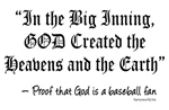
Paige's signing did come under a little bit of scrutiny, however. Indians owner Bill Veeck was known for several publicity stunts, which would later include batting a midget, having players wear shorts as part of their uniforms and disco demolition night. The initial thought was Paige was being exploited a little bit, as fans would certainly go to the stadium to see the legendary Satchel Paige pitch. After Robinson made his debut, there was a lot of talk about Paige being this dominant Negro Leagues pitcher who was as good as any pitcher who ever pitched. A crowd would have followed Paige, even if he had nothing left.
The unfortunate thing was the timing of when Paige pitched. Though he will always be regarded as the greatest pitcher in Negro Leagues history, the major leagues did not get to see him in his prime. But Veeck would wind up looking good as Paige had more left in the tank than anybody could have imagined. He would go 6-1, 2.48 in 1948 in 21 games, 7 starts. While he was not the dominant strikeout pitcher he was a couple years earlier, he was mature enough to know how to get hitters out. He pitched in game 5 of the 1948 World Series, and was the first reliever used by the Tribe that series. The first four games, the Indians starters pitched a complete game each game. Paige relieved Bob Feller and got the last two outs of an inning without giving up a run. Of course, Paige was teammates with Larry Doby, the first African American player to play in the American League and the second to manage a MLB ball club (in 1978).
Paige was released after the 1949 season, after going 4-7, 3.04 in 31 games, 5 as a starter. This was around the same time Veeck was in the process of selling the Indians to fund his divorce settlement. Paige would re-unite with Veeck, as he was signed in the middle of the 1951 season as Veeck was then the owner of the St Louis Browns. In 1951, he went 3-4, 4.79 in 23 games at age 44. Paige would have his best MLB season in 1952, going 12-10, 3.07 in 46 games, 6 starts and led the American League in games finished with 46. He had 91 strikeouts in 138 innings, making his first All Star appearance. He returned to the All Star game in 1953, though he was not as dominant. Paige went 3-9, 3.53 in a career high 57 games, but his strikeout rate dropped considerably; noteworthy because he had already seen this drop from when he pitched in the Negro Leagues. Though he never stopped pitching, 1953 was thought of to be the last Paige would pitch in the major leagues.
Paige made a miraculous return to the majors, being signed by another interesting owner, Charlie Finley with the Kansas City Athletics, This was in 1965. When Paige made a start on September 25 against the Red Sox, he was 58 years old! He would throw three scoreless innings, facing 10 batters and retiring 9 of them and gave up 1 hit and struck out 1 (Red Sox pitcher Bill Monbouquette). He would finish his career with a 28-31 record, 3.29 ERA in 179 games, 26 starts and a WHIP of 1.33. In his Negro League career, (based on statistics recorded as some may have not been found) he was 100-50, 3.22 in 176 games, 89 starts from 1927 -1947. He had a WHIP of 0.95 and struck out 1170 batters in 1298 2/3 IP. He was inducted into Baseball's Hall of Fame in 1971 by the special committee for the Negro Leagues. However, he could be considered a first ballot Hall of Famer since he stopped pitching in the majors in 1965. The 1971 election was exactly five years after he finished pitching.

 RSS Feed
RSS Feed
